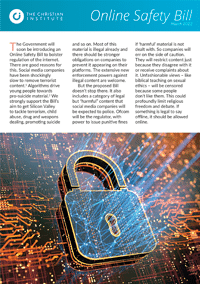A top lawyer has warned the Government that its Online Safety Bill will breach citizens’ human rights by unlawfully restricting their free speech.
In a legal opinion for campaign group Index on Censorship, Gavin Millar QC said the legislation will “result in many violations of the right of freedom of expression of internet users” under Article 10 of the European Convention on Human Rights. He described the “absence of any recognition of the risk of violations of the Article 10 right” as “concerning”.
In a briefing to MPs last month, The Christian Institute warned that the Bill needs radical amendments to prevent it from trampling on free speech.
‘Open to abuse’
The Bill would require social media companies to address ‘legal but harmful’ content, but with no clear definition of what this would encompass.
Millar said that this is “too broad and therefore open to abuse”, through selective or arbitrary enforcement by internet service providers because “the underlying concept of harm from internet speech is inherently vague”.
the underlying concept of harm from internet speech is inherently vague
He added: “Indeed, in my view, this aspect of the legal regime will inevitably be so vague that the quality of law issues will be secondary to the question of whether such a law is necessary as a general measure.
“It is difficult to see how it is, given the extent to which legitimate/protected speech will be wrongly restricted and the tendency that such a law will have to chill such expression on the internet.”
Limited protections
The QC also highlighted the poor provisions protecting free speech contained in the Bill, branding them “extremely limited”.
“They do not mandate presumptive protection for the right to a wide freedom of speech, which can only be restricted in clearly defined, limited circumstances, in the way Article 10 does.”
Following Millar’s advice, Index on Censorship said the “broad and vague” free speech duties need to be “beefed up so that social media companies have a proper set of competing duties that need to be balanced”.
On the restriction of ‘legal but harmful’ content, the group added that the duty requiring this should be removed entirely, to “ensure that speech online was treated the same as speech offline”.
The Government has introduced an Online Safety Bill to bolster regulation of the internet. It risks unfashionable views – like biblical teaching on sexual ethics – being censored because some people don’t like them. This could profoundly limit religious freedom and debate. If something is legal to say offline, it should be allowed online.
Institute’s concerns
Millar’s advice is in keeping with concerns raised by The Christian Institute, which has said that although the Bill fixes important problems, it also “puts free speech in jeopardy”.
In its briefing to MPs, it warned that tech companies are likely to censor “far more than they need to” to avoid being fined up to ten per cent of their annual global turnover if they fail to uphold their new duties.
“Silicon Valley billionaires have already shown themselves very willing to take down views they personally disagree with.” The new Bill “will put companies’ repressive tendencies on steroids”, it added.
The Institute also warned the Bill would turn Ofcom “into the most powerful internet regulator in the West”, noting that, given Ofcom and its predecessors’ track records on censoring Christian broadcasts, “free speech will be the loser”.



